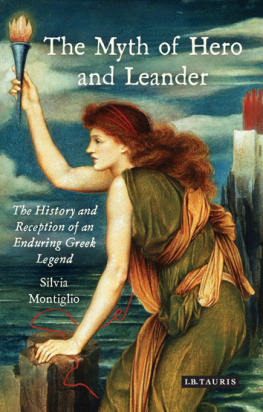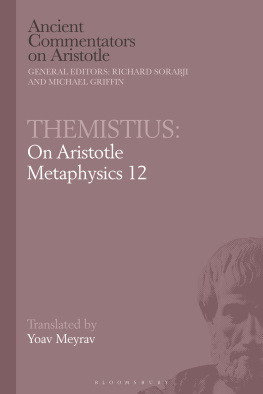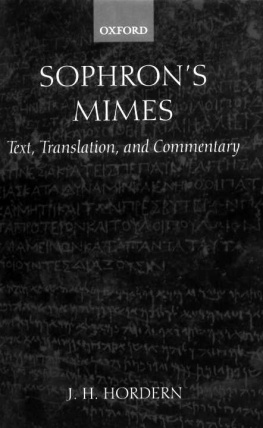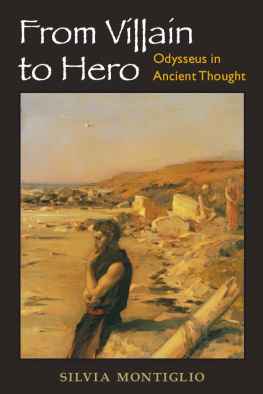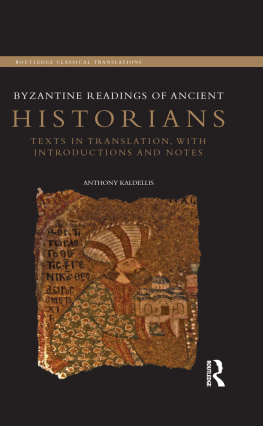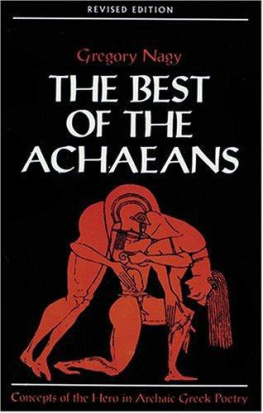
Musaeus Hero and Leander
This book offers a new English translation of Musaeus poem Hero and Leander, with the original Greek on the facing page, a substantial introduction and a detailed commentary.
The tragic romance of Hero and Leander has had and still has a great appeal, inspiring countless writers, painters, sculptors, and musicians. The Introduction aims at situating the poem within its literary tradition and cultural context as well as at drawing its major themes and describing the salient features of its style. Because Hero and Leander enjoyed an immense and uninterrupted popularity, the Introduction also devotes a large section to the poems reception in literature, which crosses paths with the reception of the other main ancient poetic treatment of the legend, Ovids Heroides 18 and 19. The commentary, which follows the Greek text and its translation, is addressed to a variety of readers: the student and the scholar of Greek literature, as well as those of other literatures in which the poem has been inspirational. This work has no precedent in the English language.
This new translation will be of interest to students and scholars of Greek and late antique literature, as well as those working on mythology and classical reception.
Silvia Montiglio is Gildersleeve Professor in Classics at Johns Hopkins University, USA. She is the author of Silence in the Land of Logos (2000), Wandering in Ancient Greek Culture (2005), From Villain to Hero: Odysseus in Ancient Thought (2011), Love and Providence: Recognition in the Ancient Novel (2013), The Spell of Hypnos: Sleep and Sleeplessness in Greek Literature (2016), and The Myth of Hero and Leander: The History and the Reception of an Enduring Greek Legend (2018).
Routledge Classical Translations
Routledge Classical Translations provides scholars and students with accurate, modern translations of key texts that illuminate distinctive aspects of the classical world and come from a range of periods, from early Greece to the Byzantine empire. Volumes include thematic groupings of texts, texts from important authors as well as texts from the Byzantine period that are relevant for the study of the classical world but which remain inaccessible. Each volume has accompanying notes and commentary that provide a solid framework for deeper understanding of the material. As well as providing translations of significant texts, the series makes available material that is untranslated into English or difficult to access, and places these texts within new contexts to open-up areas of study and support research.
Ctesias History of Persia
Tales of the Orient
Lloyd Llewellyn-Jones and James Robson
Byzantine Readings of Ancient Historians
Texts in Translation, with Introductions and Notes
Anthony Kaldellis
The Lost History of Peter the Patrician
An Account of Romes Imperial Past from the Age of Justinian Thomas Banchich
The Sorrows of Mattidia
A New Translation and Commentary
Curtis Hutt and Jenni Irving
Musaeus Hero and Leander
Introduction, Greek Text, Translation and Commentary
Silvia Montiglio
For more information about this series, please visit: www.routledge.com/classicalstudies/series/CLTRA
First published 2020
by Routledge
2 Park Square, Milton Park, Abingdon, Oxon OX14 4RN
and by Routledge
52 Vanderbilt Avenue, New York, NY 10017
Routledge is an imprint of the Taylor & Francis Group, an informa business
2020 Silvia Montiglio
The right of Silvia Montiglio to be identified as author of this work has been asserted by her in accordance with sections 77 and 78 of the Copyright, Designs and Patents Act 1988.
All rights reserved. No part of this book may be reprinted or reproduced or utilised in any form or by any electronic, mechanical, or other means, now known or hereafter invented, including photocopying and recording, or in any information storage or retrieval system, without permission in writing from the publishers.
Trademark notice: Product or corporate names may be trademarks or registered trademarks, and are used only for identification and explanation without intent to infringe.
British Library Cataloguing-in-Publication Data
A catalogue record for this book is available from the British Library
Library of Congress Cataloging-in-Publication Data
Names: Musaeus, Grammaticus, author. | Musaeus, Grammaticus. Hero and
Leander. 2020 | Musaeus, Grammaticus. Hero and Leander. English. 2020 |
Montiglio, Silvia, 1960 editor.
Title: Musaeus, Hero and Leander / Silvia Montiglio.
Other titles: Routledge classical translations.
Identifiers: LCCN 2020002332 (print) | LCCN 2020002333 (ebook) |
ISBN 9780815353249 (hardback) | ISBN 9781351137027 (ebook)
Subjects: LCSH: Musaeus, Grammaticus. Hero and Leander. | Hero (Greek
mythological character)Poetry. | Leander (Greek mythological
character)Poetry.
Classification: LCC PA4250 .M5 2020 (print) | LCC PA4250 (ebook) |
DDC 883/.01dc23
LC record available at https://lccn.loc.gov/2020002332
LC ebook record available at https://lccn.loc.gov/2020002333
ISBN: 978-0-815-35324-9 (hbk)
ISBN: 978-1-351-13702-7 (ebk)
Typeset in Times New Roman
by Apex CoVantage, LLC
This book is intended for a diverse readership: advanced students and scholars of Greek literature, Byzantinists and scholars of modern European literatures, especially comparativists. The variety of targets demands multiple approaches. The Introduction seeks to explain basic facts and to interpret the poem of Musaeus at various levels, drawing its major themes but also dealing with more technical issues such as language and style; it also devotes a relatively extensive section to the poems reception, with an eye to readers with interests other than (just) ancient literature. Likewise, in the commentary largely explanatory notes sit alongside interpretative ones and yet others dealing with technicalities and minutiae. Most of the Greek in the commentary is translated (occasionally more literally than in the version facing the Greek text) or paraphrased, except when the meaning should be clear or when the notes are of interest only to the classical scholar (for example, they concern textual problems). In the Introduction, Greek words appear in Greek if they are direct citations; when extrapolated, they are in transliteration if the paragraph is crowded with Greek terms, but they remain in Greek otherwise.
With a broader readership in mind, I have not listed the manuscripts of Hero and Leander (but I have sketched the main developments in its transmission and publication) and have printed the Greek poem without a critical apparatus, though a number of textual issues are discussed in the commentary. The Greek text is based on the modern editions mentioned here below (under Abbreviations) but does not match any of them entirely, either in the chosen variants or in the punctuation. The translation stays fairly close to the original, in order to help the reader navigate the Greek. I have generally kept the highly repetitive diction of M. with this goal in mind, and because repetitiveness is a conscious feature of his writing. The translation also tries to preserve the density and the audacity of many of his expressions as well as the artificiality of his style.



